In fact, all of the pieces have been carefully moved into place over several years – and the current Prime Minister, Theresa May, has often been at the heart of all of it.
One of the most important of these was the introduction of ‘Secret Courts’ (under the ‘Justice and Security’ legislation) under the Tory government in 2013. Another was the Investigatory Powers Bill (Snoopers Charter): the mass surveillance programme that Mrs May was trying to introduce for years and finally did in January this year.
Another is the Draconian law being proposed to deal with whistleblowers and journalists and their criminalisation.
And now we have Mrs May openly saying she needs to push aside human rights laws in order to combat terrorism.
Bullshit. But it is simply the next piece of the puzzle – along with Mrs May using the terror attack to propose taking tighter control of the Internet.
All of these things need to be viewed together, not separately, in order to understand where we’re going.
We’ll come back to the Secret Court system and mass surveillance shortly – as well as asking (and answering ) two crucial questions, (1) ‘What is a Terrorist?’ and (2) What does Theresa May define as a ‘terrorist’?
By the way, this is not to say that law and order isn’t very important. I’m as concerned about terrorism as anyone; I also think there’s way too much street crime, gang culture and knife crime. But most police officers think that too: and most police officers appear to be unhappy with Theresa May.
Theresa May has said she will change human rights laws if they “get in the way” of tackling suspected terrorists.
Most front-people for the Deep State or for false-flag/psychological-warfare operations will try to be a little more slick and try not to give the game away so completely and so immediately. But not Theresa May. She just says it openly, as if she has so little regard for the intelligence level of the general population that she doesn’t even need to be subtle. All of the victims of the June 3rd terror attack hadn’t even been identified yet and the Prime Minister was already talking about those pesky human rights laws.
It is, of course, total bollocks.
Even if you accept Manchester and London Bridge as genuine, 100% jihadist attacks with no state collusion (which I don’t – but I accept that most people do), human rights has nothing to do with it. Any of those perpetrators allegedly involved in the attacks could’ve been stopped or dealt with under existing laws.
This equating of human rights law with combating terrorism is a red herring, prefabricated to try to push through the final pieces of the Deep State puzzle and our journey into the Theresa May-trix.
Nor is it a problem that Mrs May has simply identified in response to these terror attacks. As New Statesmen correctly notes, ‘Scrapping the HRA has been Conservative policy for several years.’ The author also states outright, ‘Theresa May cannot be trusted with our national security.’

Fiona de Londras, a Professor of Global Legal Studies, sounds the warning alarm in concise terms here. She writes, ‘UK law contains extensive provisions to prevent and criminalise all forms of engagement with terrorism, including powers relating to data surveillance, disruption of terrorist financing, criminalisation of travelling for terrorist purposes, and the criminalisation of all forms of support for terrorist activities… This is the key point here. Human rights law doesn’t prevent the state from countering terrorism, but it does prevent the state from doing so in whatever way it pleases and without limitation.’
She continues, ‘It may be that there are some things the state wants to do that human rights law will not permit – mass internment, expulsion of all non-citizens without distinction, the total shut down of the internet, retention and surveillance of the content of all communications, for example, would all likely fall foul of human rights law. If the government proposed such actions and was, indeed, obstructed by human rights, would we really say human rights law is getting in the way of our security? Or would we acknowledge that it is protecting us from government overreach?’
In fact even Mrs May’s and the GCHQ’s Snoopers Charter becomes meaningless when you think about it.
The alleged June 3rd attacker, Khuram Butt, wasn’t some obscure figure hiding in the dusty alcoves of the dark web, who might’ve been weeded out with careful surveillance. He was an outspoken, unashamed ISIS supporter who even appeared on a Channel 4 documentary about jihadis. The Manchester bomber, meanwhile, had just come back from Libya and belonged to a jihadist group tied to British intelligence and foreign policy (read more). These weren’t people who’d slipped off the radar.
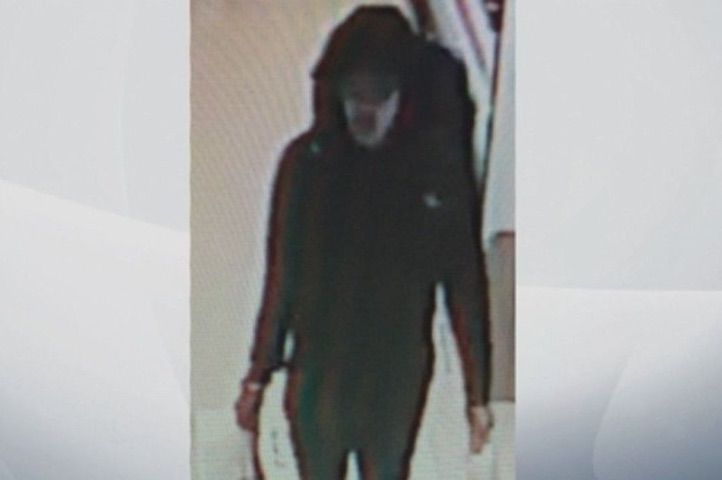
There are laws and options that already exist for combating terror plots, which is why – we’re told – so many of them have been thwarted over the years.
It is interesting that, when it comes to this subject of those pesky human rights laws, people like to talk about how difficult it was to get extremist preachers like Abu Hamza and Abu Qatada deported. Mrs May has in fact referred a lot to her struggle to get Qatada extradited to Jordan when all the human rights laws were getting in the way. It is worth noting, however, that Abu Qatada was then cleared by the Jordanian courts (hardly known for their lenience) of any charges of terrorism, due to the lack of evidence. It is also worth noting that Abu Hazma’s lawyer, Joshua Dratel, claimed Hamza had worked with MI5.
What should be patently obvious to anyone is that Mrs May is using the terror attacks (which, again, I believe were state-enabled attacks: see here and here) to simply push through pre-existing agendas.
These are all chess pieces being moved into place – Secret Courts, Snoopers Charter, the new whistleblower laws, and now a proposed bypassing of human rights laws.
This is what the state-enabled terrorism is for – we are being pushed over the finish line and into the prefabricated prison that the phony ‘War on Terror’ was designed from the beginning to bring us to. It really seems like it is that simple.
Again, what Mrs May is saying right now is simply paving the way for her government to add to the other key pieces the Deep State has already put into place. All of these things should be viewed *in conjunction* with one another.
Let’s just remind ourselves of the framework.
As said earlier, the Conservative government – while Theresa May was Home Secretary – already also introduced the ‘Secret Courts’ system in 2013.
So, let’s talk about ‘Secret Courts’. Look at this BBC report on one of the trials from February last year: the journalist essentially admits the pointlessness of the article, as he essentially can’t report anything – everything is secret.
Truepublica covered this subject aptly in 2015 in a piece titled ‘The Use Of Secret Courts Confirms The End Of Democracy In Britain’: ‘The use of secret courts is a place where trials take place that is not open to the public, nor generally reported in the news and generally no official record of the case or the judge’s verdict is made available. Often there is no legal allegation. The accused is usually not able to obtain the counsel of an lawyer or confront witnesses for the prosecution, and the proceedings are characterised by a perceived miscarriage of justice to the benefit of the ruling powers of the society…’
Liberty wrote at the time, ‘There is now effectively a parallel system of secret courts and secret evidence.’
It continued, ‘One of the most serious casualties of the ‘War on Terror’ was the ancient principle that justice should be done in public after hearing arguments from both parties. Even in cases where the answer might appear to be obvious there is a basic right to be heard and to challenge the evidence against you. The Justice and Security Act seeks to limit public scrutiny of the Government and our security services and public bodies and avoid further embarrassment by sweeping aside a centuries-old justice system…’
The act is officially defined as ‘A Bill to provide for oversight of the Security Service, the Secret Intelligence Service, GCHQ and other activities relating to intelligence or security matters; to provide for closed material procedure in relation to certain civil proceedings; to prevent the making of certain court orders for the disclosure of sensitive information; and for connected purposes.’
In essence, it is designed to immunise and protect intelligence and security services and is stacked entirely against civilians.
This is significant too in regard, for example, to everything I wrote about the Manchester attack and the connections between the British state, MI5/6 and the Libyan Al-Qaeda cells. When former MI5 officer, David Shayler, blew the whistle on the Al-Qaeda/LIFG plot, he went to jail and journalists were banned from reporting on the subject.
The Secret Court system allows this to be done whenever the government and the intelligence community wants, with journalists banned from covering the proceedings.
In “secret courts” (Closed Material Procedures), the civilian (and their lawyer – if they’re afforded one) can – under this legislation – not even be present for the proceedings, not be allowed to see the evidence, not be allowed to challenge the evidence, and not be allowed to know the reasons for the ‘judge’s’ verdict.
In addition, of course, Britain – at the beginning of 2017 – saw the passing of what has been called “most extreme surveillance law ever passed in a democracy”. The Investigatory Powers Bill – commonly known as the Snooper’s Charter – was finally passed by Parliament.
For the record, we’ve had three terror attacks since it was passed into law – prior to this we’d had no major attack for 12 years (which seemingly demonstrates that it doesn’t help stop terrorism).
As I pointed out as soon as she became Prime Minister, there are few politicians in Westminster who’ve been more obsessed than GCHQ front-person Theresa May with mass surveillance, the Snooper’s Charter, the curtailing of civil liberties and privacy and using the largely manufactured threat of terrorism to try to acquire more and more total control of people’s lives.
Long before Brexit, Privacy International had warned that Theresa May had an “insatiable appetite” for pushing ahead with expanding the state’s powers of surveillance. The target is not terrorists, but everyone – including journalists, activists, whistleblowers and, eventually, dissidents.
Michelle Stanistreet, general secretary of the National Union of Journalists told The Guardian (in regard not to the Snooper’s Charter, but the newly proposed laws against whisteblowers and journalists), “It was the present prime minister Theresa May who was the ‘Big Sister’ and original architect of the snoopers’ charter,” adding that “We need to protect the public from a government which seems intent on threatening journalists from finding information the government finds inconvenient to be exposed.”
John Naughton, writing in The Guardian before Brexit, described it as ‘a Machiavellian masterpiece.’
So where does that leave us? Secret Courts – check. Mass surveillance programme – check. Criminalisation of journalism and whistleblowing – check. All that’s left now is the nuisance of the Internet and its independent platforms, and yes, those pesky Human Rights issues – and Mrs May has openly said in the last few days that both of those are now going to be reassessed.
What more is needed before the intention can be regarded as blatantly obvious?
Armed troops on the street to replace ordinary police? Well, we’ve already had a taste of that now. And let’s look at France – they put armed soldiers out into the streets in January 2015 after the Charlie Hebdo false-flag; and the troops are still out there.
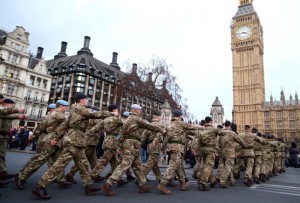
So Theresa May says the human rights act gets in the way of fighting terrorists.
So what is a ‘terrorist’?
It is interesting how expansive the definition can be. Today we might think of a ‘terrorist’ as a bearded jihadi swearing allegiance to ‘ISIS’. But what about tomorrow?
Well, here’s a good example of how broad a definition of ‘terrorist’ Mrs May is inclined to work from. Much was made of the nine-hour detention of David Miranda, the partner of The Guardian journalist Glenn Greenwald. He ran a series of stories centered on secret NSA documents leaked by Edward Snowden, and was detained under Theresa May’s policies for ‘national security’ purposes – though he had committed no crime. The Guardian reported that former Liberal Democrat leader Nick Clegg had confronted May over this detention of the journalist under the ‘Terrorism Act’.
Who else could potentially be a terrorist?
A former head of the NSA (of which Britain’s GCHQ is, according to Ed Snowden, a subsidiary) and CIA even compared privacy advocates and anti-surveillance activists to terrorists.
Public Intelligence notes a flyer created by the FBI and Department of Justice to encourage reporting of suspicious activity, which highlighted that ‘espousing conspiracy theories or anti-US rhetoric should be considered a potential indicator of terrorist activity.’
Documents obtained by the American Civil Liberties Union (ACLU) during the Bush era, revealed in 2006, that the Pentagon was conducting major surveillance on scores of entirely non-violent protesters as part of an ‘anti-terrorism database‘.

Yves Smith, writing in 2012, noted that then-newly-declassified documents proved that the federal government had treated peaceful protesters as terrorists, with the FBI in particular collaborating with the banks to suppress peaceful protesters involved in Occupy Wall Street. Naomi Wolf also reported on how the banks and the FBI conducted joint efforts to suppress the Occupy movement.
In his book, No Place to Hide, Glenn Greenwald writes: ‘The perception that invasive surveillance is confined only to a marginalised and deserving group of those “doing wrong” – the bad people – ensures that the majority acquiesces to the abuse of power or even cheers it on. But that view radically misunderstands what goals drive all institutions of authority. “Doing something wrong” in the eyes of such institutions encompasses far more than illegal acts, violent behaviour and terrorist plots. It typically extends to meaningful dissent and any genuine challenge. It is the nature of authority to equate dissent with wrongdoing, or at least with a threat.’
Those are the ‘terrorists’ and ‘threats to security’ of tomorrow. And this is why it is so important not to make the mistake of thinking it’s all about ‘ISIS’ or scary jihadists.
And Theresa May is, basically, spelling it out for you – so that no one can later plead ignorance.
She relies on the fact that the masses are so distracted either by the shiny Brexit or by the fear/anxiety from terror attacks that they either won’t notice these things or they won’t care – and will, in fact, give away their liberties and the soul of their society willingly.
The trick – which too many people keep falling for – is being made to think that this is all about now and is all about stopping the evil terrorists. The terror attacks are only the mechanism, the premise, via which these changes to law and society can be brought about and justified (just like 9/11 and the Patriot Act).
They get people scared enough, anxious enough, docile enough, to not only go along with the agenda – but to openly vote for it.
We are helping build our own prison – and most of us won’t realise it until it is too late.
_______________

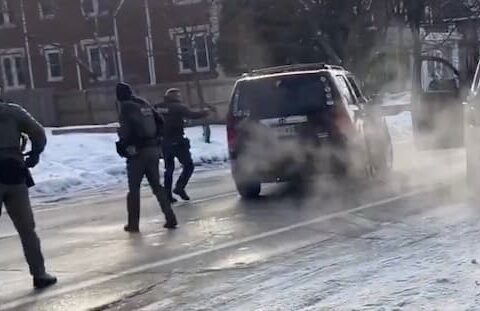
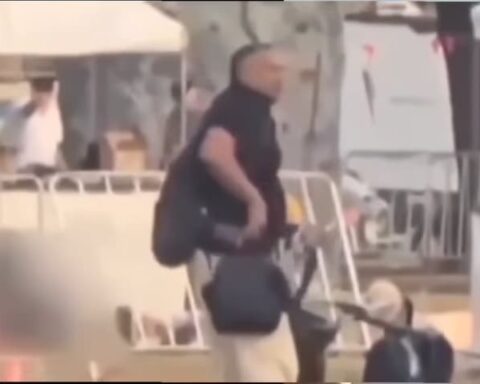
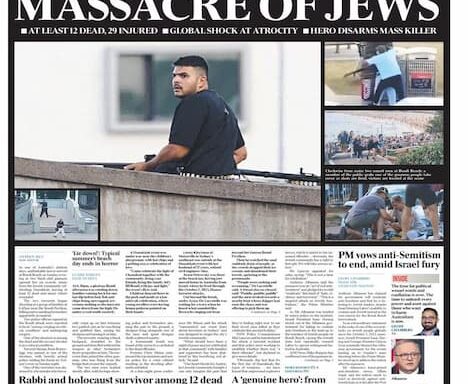
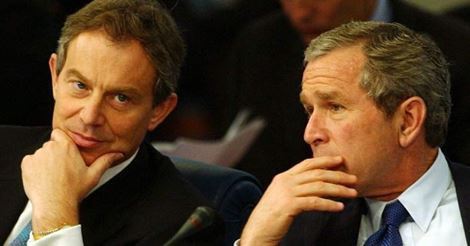
The msm made a big deal of corbyn voting against anti terror legislation, rarely reporting his response that there needs to be judicial oversight if the law is to do it’s job whilst protecting our democracy and our rights. There has also been very little reporting of Keir Starmer pointing out that there is nothing in the human rights act which hinders the fight against terrorism. With the media in lock-step with the tory government and the legislation that’s already in place, or planned, we are already pretty far down the road to a police/fascist state. It the turkeys vote for xmas today we could be at the end of that road before the end of the next parliament. Who knows if they succeed we may not have another election after this one.
I was thinking that too – but I didn’t say it, because I thought it might seem a bit too dramatic.
In terms of the media being in lock-step with the Tories, I will say that the broadcast media – especially the BBC and Channel 4 – became a lot fairer and less biased once the snap election was called and gave Corbyn a much fairer go. I think some of them are genuinely more scared of Theresa May and a one-party state than they are of the ‘scary socialist’.
Brilliant! Thank you